Stocks rise as outflows resume, Gold investors are surprised by the decline.
Stock-Markets / Financial Markets 2011 Jan 15, 2011 - 06:00 AM GMT New Year Unemployment Claims Surge.
New Year Unemployment Claims Surge.
(ZeroHedge) Thursday's initial claims number throws cold water to all those who expected the trend in claims to be improving. At 445K, this was a huge miss to expectations of 410K, and a major deterioration from last week's (upwardly revised of course) 410K (was 409K before). Elsewhere, continuing claims came at 3,879K on expectations of 4,088K (with the previous naturally revised higher as well from 4,103K to 4,127K). And the kicker: in NSA terms initial claims were a mammoth 770,413, a 191,686 increase in just one week, and the highest NSA number in one year!
Consumer Prices in U.S. Rose 0.5% in December; Core Up 0.1%
(Bloomberg) The cost of living in the U.S. climbed more than forecast in December, led by higher fuel and food prices, while other goods and services showed the smallest annual increase on record. The consumer-price index increased 0.5 percent, more than the 0.4 percent median estimate of economists surveyed by Bloomberg News, figures from the Labor Department showed today in Washington. The so-called core rate, which excludes volatile food and fuel costs, rose 0.1 percent, in line with the median projection.
Consumer Confidence Slips (not) Surprisingly on Jobs, Fuel Costs
(Bloomberg) Confidence among U.S. consumers unexpectedly declined in January as more Americans worried about the effects of higher gasoline prices on their finances. The Thomson Reuters/University of Michigan preliminary index of consumer sentiment for the month dropped to 72.7, the lowest since November, from 74.5 in the previous month. Economists surveyed by Bloomberg News projected a gain to 75.5, according to the median forecast.
Stocks rise as outflows resume?
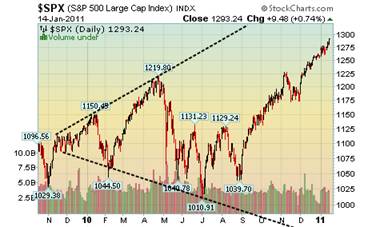 -- The Investment Company Institute just revised the last two data points of 2010 which were originally inflows modestly to one outflow and one minimal inflow. More importantly it has disclosed the first flow of funds in 2011. The year starts with an equity outflow, confirming that the retail investors are really not as foolish as the Fed and the Primary Dealers believe they are. And what an outflow: at $4.2 billion, this was the largest one week outflow since early October!
-- The Investment Company Institute just revised the last two data points of 2010 which were originally inflows modestly to one outflow and one minimal inflow. More importantly it has disclosed the first flow of funds in 2011. The year starts with an equity outflow, confirming that the retail investors are really not as foolish as the Fed and the Primary Dealers believe they are. And what an outflow: at $4.2 billion, this was the largest one week outflow since early October!
The Long Bond is still in the dumps.
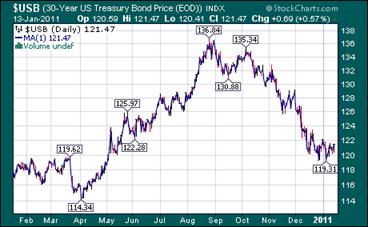 --Treasuries gained, pushing 10-year note yields to a three-week low, after data showed U.S. retail sales increased in December less than forecast. The yield on the benchmark 10-year note fell for a second day as another report showed consumer confidence unexpectedly slipped this month. The Federal Reserve is buying today $6 billion to $8 billion of Treasuries due from January 2015 to June 2016 as part of its plan to pump $600 billion into the economy to spur growth, according to its website.
--Treasuries gained, pushing 10-year note yields to a three-week low, after data showed U.S. retail sales increased in December less than forecast. The yield on the benchmark 10-year note fell for a second day as another report showed consumer confidence unexpectedly slipped this month. The Federal Reserve is buying today $6 billion to $8 billion of Treasuries due from January 2015 to June 2016 as part of its plan to pump $600 billion into the economy to spur growth, according to its website.
Gold investors are surprised by the decline.
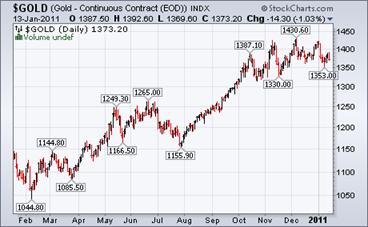 --Gold fell to the lowest price in a week on speculation that European Union leaders will stabilize the region’s economy, eroding the appeal of the metal as a haven.
--Gold fell to the lowest price in a week on speculation that European Union leaders will stabilize the region’s economy, eroding the appeal of the metal as a haven.
Gold futures for February delivery fell $22.40, or 1.6 percent, to $1,364.60 an ounce at 10:24 a.m. on the Comex in New York. Earlier, the price touched $1,360.30, the lowest since Jan. 7.
Japan’s Stocks begin to roll over.
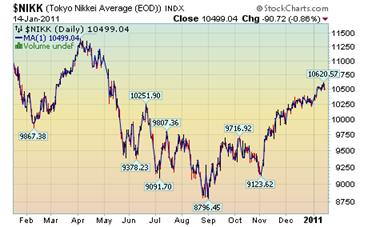 --Japanese stocks fell, driving the Topix index to its first decline in six days, as a weaker dollar dragged down exporters, and tiremakers dropped after Nikko Cordial Securities Inc. assigned ratings of “underperform.” The Nikkei 225 Stock Average fell 0.9 percent to 10,499.04 at the close in Tokyo. The broader Topix index dropped 0.8 percent to 930.31, with about three shares declining for every two that advanced. Most companies climbed earlier, and both gauges rose yesterday to their highest closes since May.
--Japanese stocks fell, driving the Topix index to its first decline in six days, as a weaker dollar dragged down exporters, and tiremakers dropped after Nikko Cordial Securities Inc. assigned ratings of “underperform.” The Nikkei 225 Stock Average fell 0.9 percent to 10,499.04 at the close in Tokyo. The broader Topix index dropped 0.8 percent to 930.31, with about three shares declining for every two that advanced. Most companies climbed earlier, and both gauges rose yesterday to their highest closes since May.
The Peoples Bank of China orders higher reserves.
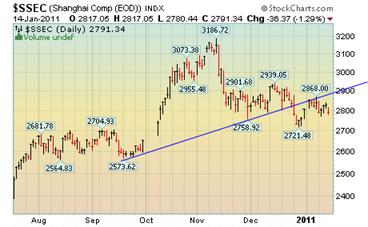 -- China’s stocks fell, erasing the benchmark index’s gains this year, on speculation the government will announce increases in interest rates and bank reserve requirements as early as today to curb inflation. The Shanghai Composite Index, which tracks the bigger of China’s stock exchanges, fell 36.4, or 1.3 percent, to 2,791.34 at the 3 p.m. close. After the market close, the central bank ordered banks to set aside more reserves by 50 basis points from Jan. 20. It’s the first move this year after six increases in 2010.
-- China’s stocks fell, erasing the benchmark index’s gains this year, on speculation the government will announce increases in interest rates and bank reserve requirements as early as today to curb inflation. The Shanghai Composite Index, which tracks the bigger of China’s stock exchanges, fell 36.4, or 1.3 percent, to 2,791.34 at the 3 p.m. close. After the market close, the central bank ordered banks to set aside more reserves by 50 basis points from Jan. 20. It’s the first move this year after six increases in 2010.
The Dollar Weathers a Cyclical Pullback...and Comes Back for More.
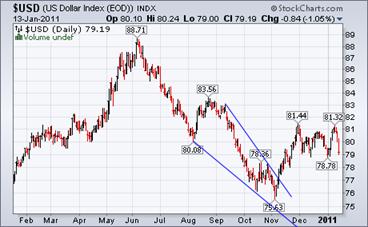 -- The dollar was headed for its biggest weekly loss since September against the currencies of major U.S. trading partners as consumer confidence unexpectedly fell and retail sales rose less than economists forecast.
-- The dollar was headed for its biggest weekly loss since September against the currencies of major U.S. trading partners as consumer confidence unexpectedly fell and retail sales rose less than economists forecast.
The Thomson Reuters/University of Michigan preliminary index of consumer confidence dropped to 72.7 this month from 74.5 in December. The median forecast of 72 economists in a Bloomberg News survey was for an increase to 75.5.
More Than One Million Homes Foreclosed on in 2010
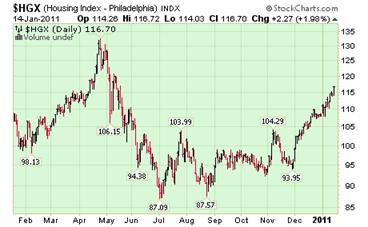 -- (PBS) Today comes the official tally for 2010: more than one million homes foreclosed on, with another FIVE million homeowners at least two months behind on their payments, according to foreclosure tracker RealtyTrac. Rick Sharga, a vice president at the firm, says this year isn't looking any better. "We could easily see a 20 percent increase in both total foreclosure activity and bank repossessions in 2011," he told us, adding that he expects it to be "the peak year for foreclosure activity."
-- (PBS) Today comes the official tally for 2010: more than one million homes foreclosed on, with another FIVE million homeowners at least two months behind on their payments, according to foreclosure tracker RealtyTrac. Rick Sharga, a vice president at the firm, says this year isn't looking any better. "We could easily see a 20 percent increase in both total foreclosure activity and bank repossessions in 2011," he told us, adding that he expects it to be "the peak year for foreclosure activity."
Gasoline Prices Up Five Months in a Row.
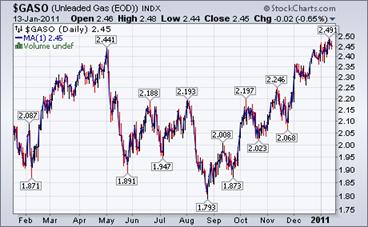 --The Energy Information Agency weekly report states, “The U.S. average retail price for a gallon of gasoline increased for the sixth straight week, advancing almost two cents versus last week to $3.09 per gallon, $0.34 per gallon higher than last year at this time. Prices on the West Coast jumped two and a half cents, the largest increase in the country, followed by the Midwest, where prices were a full two cents higher.”
--The Energy Information Agency weekly report states, “The U.S. average retail price for a gallon of gasoline increased for the sixth straight week, advancing almost two cents versus last week to $3.09 per gallon, $0.34 per gallon higher than last year at this time. Prices on the West Coast jumped two and a half cents, the largest increase in the country, followed by the Midwest, where prices were a full two cents higher.”
Natural Gas consumption increased last week.
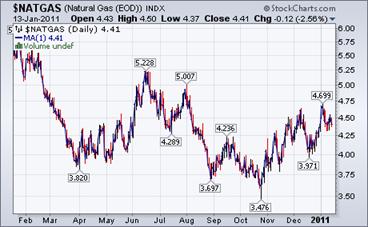 -- The U.S. Energy Information Administration reports, “As a strong cold-air mass pushed deep into the middle and eastern parts of the country this report week (January 5-12), natural gas demand for space heating and as a fuel for electric power plants increased significantly. Compared with the prior week, U.S. natural gas consumption increased about 19 percent, and exceeded 100 Bcf per day (Bcf/d) in each of the last three days,”
-- The U.S. Energy Information Administration reports, “As a strong cold-air mass pushed deep into the middle and eastern parts of the country this report week (January 5-12), natural gas demand for space heating and as a fuel for electric power plants increased significantly. Compared with the prior week, U.S. natural gas consumption increased about 19 percent, and exceeded 100 Bcf per day (Bcf/d) in each of the last three days,”
More banks walking away from homes, adding to housing crisis
(Chicago Tribune) A new type of property is adding to neighborhood blight: the bank walkaway.
Research to be released Thursday, the first of its kind locally, identifies 1,896 "red flag" homes in Chicago — most of them are in distressed African-American neighborhoods — that appear to have been abandoned by mortgage servicers during the foreclosure process, the Woodstock Institute found.
Abandoned foreclosures are increasing as mortgage investors determine that, at sale, they can't recoup the costs of foreclosing, securing, maintaining and marketing a home, and they sometimes aren't completing foreclosure actions. The property, by then usually vacant, becomes another eyesore in limbo along blocks where faded signs still announce block clubs.
US Banks Report Phantom Income on $1.4 Trillion Delinquent Mortgages; Purposeful Delays to Inflate Earnings?
(Mish) The giant US banks have been bailed out again from huge potential writeoffs by loosey-goosey accounting accepted by the accounting profession and the regulators. They are allowed to accrue interest on non-performing mortgages ” until the actual foreclosure takes place, which on average takes about 16 months.
All the phantom interest that is not actually collected is booked as income until the actual act of foreclosure. As a result, many bank financial statements actually look much better than they actually are. At foreclosure all the phantom income comes off the books of the banks.
Business Owners Blast IL Tax Hikes, Prepare to Escape to WI
(Mish) Tax insanity in Illinois is now official. Governor Pat Quinn signed off on a 67% hike in personal income taxes and a 46% hike in corporate taxes the moment the bill hit his desk.
The personal income tax rate immediately rises to 5 percent, up from 3 percent. The corporate income tax rate rises immediately to 7 percent, up from 4.8 percent. The Chicago Tribune reports Quinn, House Speaker Michael Madigan and Senate President John Cullerton — all Chicago Democrats — muscled the tax hike through in the eleventh hour of the lame-duck legislature. Only Democrats voted for the bills
Latest Inflation Riot Tally: Algeria, Tunisia, Morocco, Yemen And Jordan
(ZeroHedge) The Fed chairman is 100% confident inflation can be contained. Rapidly spreading food riots in 5 countries so far violently argues otherwise. Could it happen here?
JP Morgan Wins: CFTC Position Limits Do Not Apply (To Them)
 (ZeroHedge) Speaking of changing the rules...
(ZeroHedge) Speaking of changing the rules...
Gold and silver are now down hard over the past two days and the reason may have something to do with the fact that the CFTC utterly caved to JPM in their long-awaited decision on position limits in a 4-1 vote.
While position limits will eventually be set, maybe, someday, the course of action taken by the CFTC grandfathers in JPM's (and HSBC, et al) current outlandish positions.
10 Things That Would Be Different If The Federal Reserve Had Never Been Created
(The Economic Collapse) The vast majority of Americans, including many of those who believe that they are "educated" about the Federal Reserve, do not really understand how the Federal Reserve really makes money for the international banking elite. Many of those opposed to the Federal Reserve will point to the record $80.9 billion in profits that the Federal Reserve made last year as evidence that they are robbing the American people blind. But then those defending the Federal Reserve will point out that the Fed returned $78.4 billion to the U.S. Treasury. As a result, the Fed only made a couple billion dollars last year. Pretty harmless, eh? Well, actually no. You see, the money that the Federal Reserve directly makes is not the issue. Rather, the "magic" of the Federal Reserve system is that it took the power of money creation away from the U.S. government and gave it to the bankers.
Traders alert: The Practical Investor is currently offering the daily Inner Circle Newsletter to new subscribers. Contact us at tpi@thepracticalinvestor.com for a free sample newsletter and subscription information.
Our Investment Advisor Registration is on the Web
We are in the process of updating our website at www.thepracticalinvestor.com to have more information on our services. Log on and click on Advisor Registration to get more details.
If you are a client or wish to become one, please make an appointment to discuss our investment strategies by calling Connie or Tony at (517) 699-1554, ext 10 or 11. Or e-mail us at tpi@thepracticalinvestor.com .
Anthony M. Cherniawski, President and CIO http://www.thepracticalinvestor.com
As a State Registered Investment Advisor, The Practical Investor (TPI) manages private client investment portfolios using a proprietary investment strategy created by Chief Investment Officer Tony Cherniawski. Throughout 2000-01, when many investors felt the pain of double digit market losses, TPI successfully navigated the choppy investment waters, creating a profit for our private investment clients. With a focus on preserving assets and capitalizing on opportunities, TPI clients benefited greatly from the TPI strategies, allowing them to stay on track with their life goals
Disclaimer: The content in this article is written for educational and informational purposes only. There is no offer or recommendation to buy or sell any security and no information contained here should be interpreted or construed as investment advice. Do you own due diligence as the information in this article is the opinion of Anthony M. Cherniawski and subject to change without notice.
Anthony M. Cherniawski Archive |
© 2005-2022 http://www.MarketOracle.co.uk - The Market Oracle is a FREE Daily Financial Markets Analysis & Forecasting online publication.



